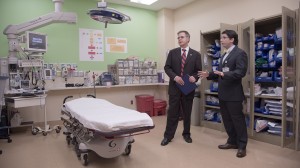
Jeffrey Vitter (left), the University of Mississippi’s new chancellor, gets an explanation of how the trauma room at the pediatric ED operates from emergency medicine pediatrician Dr. Benjamin Dillard.
When Jeffrey Vitter speaks of the University of Mississippi in Oxford, he speaks of the University of Mississippi Medical Center in Jackson.
“The University of Mississippi is one university, and the two campuses are incredibly important components,” said Vitter, who on Jan. 1 begins work as UM’s chancellor. “We have the synergy and the opportunities to collaborate, grow and expand, and we have a real competitive advantage if we can improve how faculty at both campuses collaborate.”
Vitter on Thursday spent the day at UMMC, meeting with faculty and staff and visiting hospitals and research facilities. His tour led by Dr. LouAnn Woodward, vice chancellor for health affairs and School of Medicine dean, included the Guyton Research Center, the Conerly Critical Care Hospital, the Children’s Cancer Clinic, and the adult and pediatric Emergency Departments.
He got a bird’s-eye view of the expanse of the Medical Center at the helipad from which AirCare flies, and a visual update on construction of the new School of Medicine and the Translational Research Center.
“It was really an impressive display of how much this Medical Center means to the state of Mississippi,” said Vitter, who comes to UM after serving as provost and executive vice chancellor at the University of Kansas. “It really reinforced how important UMMC is to the state and nation.”
A computer scientist and New Orleans native, Vitter earned his undergraduate degree in math from the University of Notre Dame and his Ph.D. in computer science at Stanford. He also has an MBA from Duke.
Vitter, who hopes as chancellor to spend one day a week at UMMC, said during meetings with students on both campuses in October that his key areas of focus will be increasing academic excellence, building international ties, expanding research and fundraising, and improving diversity in faculty and staff.
During his tour of UMMC, Vitter visited Mississippi MED-COM and was briefed about the Medical Center’s critical role in statewide disaster response. MED-COM provides a single point of emergency and disaster contact statewide, explained Jonathan Wilson, UMMC’s chief administrative officer. “On our hand-held radios, we can talk (to emergency responders) from the Gulf Coast to Memphis,” Wilson said.
When the Deepwater Horizon oil spill on the Gulf Coast unfolded in 2010, “we were the only common link between agencies,” said Donna Norris, MED-COM’s clinical director. “We were the hub that helped everyone link together.”
Dr. Renate Savich, professor of pediatrics and chief of the Division of Neonatology and Newborn Services, and Dr. Bolaji Famuyide, associate professor of pediatrics and neonatology and medical director of NICU and Nursery Services in the Division of Newborn Medicine, escorted Vitter through the 100-bed NICU, where he saw tiny babies receiving specialized care from nurses, physicians, residents and fellows.
“More space, and more modern space – that’s one of our most acute needs,” Woodward told Vitter.
“We have lots of caregivers here,” Savich said. “It’s a phenomenal mentality. We’re working hard.”
When Vitter stopped to chat with a half-dozen pediatric residents and fellows who were in a rounding group, he jokingly asked them what their favorite television medical show is. “Scrubs!” they answered, referring to the comedy that chronicled the lives of employees in a fictional teaching hospital.
The work of UMMC’s pediatric team, however, is serious, Savich said. “They’re talking about every patient. What’s the plan? What will we be doing for this patient over the next 24 hours?” she explained to Vitter. “It takes hours to round, because there are so many patients.”
“I was very impressed by the Children’s Hospital,” Vitter said following his campus tour. “I was extremely moved by the NICU, and the incredibly tiny infants brought up to be healthy individuals for a lifetime because of their care here.”
Just one example of collaboration between the two campuses, Vitter said, is “reporting data as a whole instead of for separate campuses. “Both campuses can do some much more if they can build on each other’s connections and strengths,” he said.
There’s a huge opportunity, Vitter said, to elevate the university nationally through building on the longstanding UM-UMMC relationship.
“The leadership team at UMMC is very strong,” he said. “I want to work to advance the university and help bring in the necessary resources, and to allow smooth operations with the state so we as a university can be as successful as possible.”